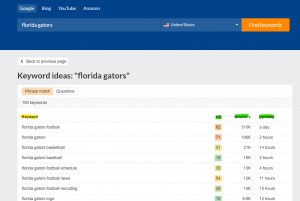27 Keywords and Keyword Research
Keywords are essential to effective optimization of your website or webpage, and there are a variety of ways to use keywords to attract readers to your writing. Before we examine the different ways to use keywords, though, let’s first explore what keywords mean in relationship to SEO.
Understanding Keywords
In terms of SEO, keywords refer to words or phrases that users might enter into a search engine in order to find something they are looking for. For instance, imagine that you need to buy an outfit for an upcoming event. You might search for “formal dress” or “tuxedo.” These are relevant keywords, but they’re vague keywords that might not get you too far in your search. If you get further along in your shopping process and realize what you really need is a “strapless blue gown” or “double breasted tuxedo jacket,” the results on the search page will be much more tailored to your needs.
As a web writer, you need to essentially reverse this scenario. You need to anticipate what your readers are most likely to type into the search bar to find your content, and then you should use those keywords throughout your web page.
You might be wondering, though, are you “tricking” your readers with this kind of tactic? There are, indeed, individuals and organizations that use what are called “black hat” tactics to draw users to their sites. For instance, a company might embed a relevant keyword all over a web page and use black text with a black background so the text can’t be seen. This would be considered a black hat tactic because it is an unethical approach to SEO. And sites can get de-listed if they are caught engaging in these practices.
However, if you use relevant keywords naturally throughout your writing, you are actually helping readers see the relevance of your page to their search. This, in itself, is not only acceptable but helpful to readers and to algorithms.
Keyword Research
Depending on the context in which you are writing, you might actually start your writing process by conducting keyword research. Strategies for keyword research vary, and your selected strategy will depend on your context. For example, if you are working for a sports marketing company and blogging about an upcoming college’s athletics season, you would likely use a keyword search tool to identify commonly searched for terms. (Some tools are paid, whereas others are free.) Since these tools change often, it’s best to simply search for free SEO tools in your web browser. I’ll share an example using the free tool, ahrefs:
Revisiting my sports marketing scenario, I went to ahrefs and typed in my alma mater, the Florida Gators. As you can see from the keyword search results, popular search terms include phrases such as “florida gators football” and “florida gators football news.” If we dig a little deeper, this tool provides the Keyword Density (KD) and volume. Keyword density refers to the number of times a particular keyword or phrase is used on a page. It’s technically a percentage representing the number of times a keyword or phrase appears on a website as compared to the total number of words on a page.
Figure 4: Ahrefs Search for “Florida Gators”
Often, writers might use these kinds of results to either determine what topic to write about and/or what keywords and phrases they should use within their article or blog. So, for example, I might choose to write about football since it appears to be the most popular sport searched. In a different vein, if I already has been assigned to write about football, I might focus on the upcoming schedule since that is a popular keyword.
As a web writer, it’s important to keep in mind that quality content is the most important. Writers should avoid embedding keywords unnaturally just to get readers to their site. However, keyword research can help you get in the minds of readers and ensure you are writing about something that others care about.


